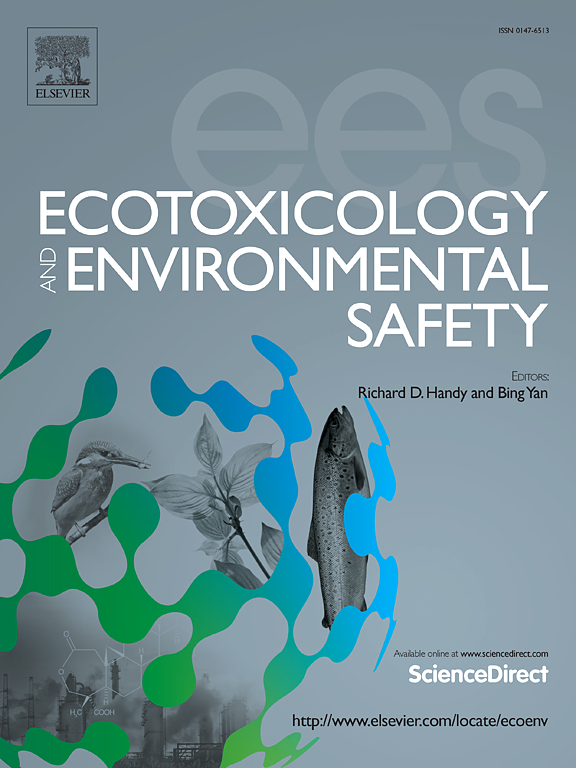Increased RPE-wearing time and hand-washing frequency associated with lower urinary pollutant levels among Hong Kong e-waste workers
IF 6.1
2区 环境科学与生态学
Q1 ENVIRONMENTAL SCIENCES
引用次数: 0
Abstract
Workers are exposed to hazardous chemicals from e-waste recycling. Protective measures such as respiratory protective equipment (RPE) and hand hygiene may reduce chemical exposure, but their effectiveness in the e-waste recycling industry remains underexplored. Therefore, a cross-sectional study was conducted from June 2021 to September 2022 involving 101 e-waste workers in Hong Kong during the COVID-19 pandemic to fill such research gap. Participants reported changes in RPE-wearing time and hand-washing frequency compared to pre-pandemic levels. First-spot morning urine samples were collected and analyzed for metals and organic pollutants. Associations between increased protective behaviors and urinary chemical concentrations were assessed using multivariate log-link linear regression models. The results showed that 31.7 % of workers increased RPE use (54.4 % of them wearing medical masks) and 49.5 % increased hand-washing frequency during the pandemic compared with pre-pandemic levels. Increased RPE use was associated with significantly lower urinary concentrations of nine chemicals. Increased hand-washing frequency showed even greater associations with diminished levels of 14 pollutants. Workers who increased both protective behaviors exhibited the greatest decreases in chemical burden. These associations were more pronounced among workers involved in dismantling/repairing e-waste and those employed by non-subsidized entities. In conclusion, enhanced preventive behaviors (RPE use and hand-washing frequency) are significantly associated with decreased chemical exposure levels among e-waste workers in Hong Kong. While engineering controls remain essential, these simple and cost-effective measures provide practical improvements in occupational safety and health, particularly for resource-limited settings where workers face elevated exposure risks due to primitive recycling practices in both developed and developing regions.
香港电子废物处理工人佩戴rpe的时间和洗手频率增加与尿液污染物水平降低有关
工人们暴露在电子垃圾回收产生的有害化学物质中。呼吸防护设备(RPE)和手部卫生等防护措施可能会减少化学物质的暴露,但它们在电子废物回收行业中的有效性仍有待探索。因此,我们在2021年6月至2022年9月期间对香港101名电子垃圾工人进行了横断面研究,以填补这一研究空白。与大流行前的水平相比,参与者报告了佩戴rpe的时间和洗手频率的变化。首先收集早晨的尿样并分析金属和有机污染物。使用多变量对数链接线性回归模型评估保护行为增加与尿液化学物质浓度之间的关系。结果显示,与大流行前相比,大流行期间,31.7% %的工人增加了RPE使用(其中54.4% %佩戴医用口罩),49.5% %的工人增加了洗手频率。RPE使用量的增加与尿中9种化学物质浓度的显著降低有关。洗手频率的增加与14种污染物水平的降低有着更大的联系。增加这两种保护行为的工人表现出最大的化学负担减少。这些联系在参与拆卸/修理电子废物的工人和受雇于无补贴实体的工人中更为明显。总之,加强预防行为(RPE使用和洗手频率)与降低香港电子废物工人的化学物质暴露水平显著相关。虽然工程控制仍然至关重要,但这些简单和具有成本效益的措施切实改善了职业安全和健康,特别是在资源有限的环境中,由于发达地区和发展中地区原始的回收做法,工人面临较高的接触风险。
本文章由计算机程序翻译,如有差异,请以英文原文为准。
求助全文
约1分钟内获得全文
求助全文
来源期刊
CiteScore
12.10
自引率
5.90%
发文量
1234
审稿时长
88 days
期刊介绍:
Ecotoxicology and Environmental Safety is a multi-disciplinary journal that focuses on understanding the exposure and effects of environmental contamination on organisms including human health. The scope of the journal covers three main themes. The topics within these themes, indicated below, include (but are not limited to) the following: Ecotoxicology、Environmental Chemistry、Environmental Safety etc.

 求助内容:
求助内容: 应助结果提醒方式:
应助结果提醒方式:


